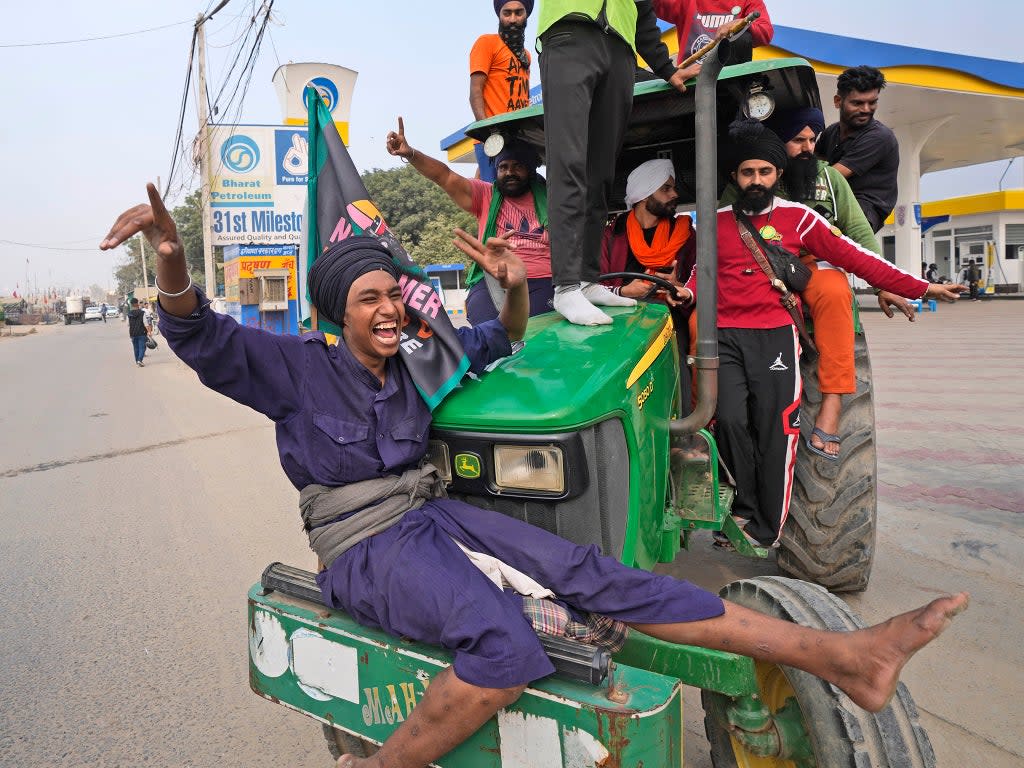India withdraws three controversial farm laws after more than a year of protest, announces Narendra Modi

India will be repealing its three hugely controversial farm laws by the end of this month, more than a year after the start of widespread protests against them, announced prime minister Narendra Modi on Friday.
The laws led tens of thousands of protesters to march on the capital Delhi last November, beginning a sit-in protest that has caused huge physical disruption, blocked the government’s legislative agenda and led to the deaths of hundreds of farmers.
In an address to the nation on Friday morning, Mr Modi said: “We tried our best to explain to farmers. We were even ready to modify the laws and then suspend them too. The matter reached the Supreme Court as well.
“We haven’t been able to explain to our farmers. This is not a time to blame anyone. I want to tell you that we have taken the farm laws back. We are repealing the farm laws,” Mr Modi announced.
The government will finish the process of repealing the three laws in the upcoming parliament session, he said. India will begin its winter session of parliament on 29 November.
The announcement comes on a symbolic day for many Sikh farmers with India celebrating the birthday of the founder of Sikhism Guru Nanak — a day that is especially highly revered and celebrated in northern India’s Punjab, part of the agricultural “rice bowl” of India.
The controversial laws represented the biggest reforms to Indian agriculture in decades, disrupting the established network of government-owned local wholesale markets – where many farmers are required to sell their produce at a fixed price, sometimes subsidised by the public coffers – and replacing them with free markets. It would also have brought in strict penalties for traders who stockpile essential commodities for future sales.
The government had insisted throughout that the laws would empower farmers, doing away with an antiquated system in favour of one that encouraged private investment and allowed producers to export their goods anywhere in India.
Farmers’ unions, however, feared that opening up the industry would devastate many people’s livelihoods, leaving small growers vulnerable to exploitation and ultimately for the withdrawal of the fixed fee they receive for goods, the minimum support price.
The leader of one of the largest farmer unions, Rakesh Tikait, said farmers will not stop their protests and will wait till the laws are withdrawn in parliament. Mr Modi had requested in his address that the sit-ins stop immediately and farmers “go back to their homes”.
“The agitation will not be taken back,” said Mr Tikait. “We will wait for the day when the farm laws will be scrapped in the parliament. Government should talk on other issues of farmers too, besides minimum support price,” the leader said in a tweet.
Samyukt Kisan Morcha, another farmers’ union which spearheaded the protests, said that they welcome the decision to repeal “all three anti-farmer, pro-corporate black laws first brought in as ordinances in June 2020”.
However, they will wait for the announcement to take effect through due parliamentary procedures. “If this happens, it will be a historic victory of the one year long farmers’ struggle in India. However, nearly 700 farmers have been martyred in this struggle. The central government’s obstinacy is responsible for these avoidable deaths, including the murders at Lakhimpur Kheri,” the union said.
They added that farmers have some other important demands related to the sector which are still pending.
Besides the impact of the farm laws themselves, the Modi administration has also been strongly criticised by India’s opposition parties for bulldozing the laws through parliament without any consultation with any of the 28 Indian states or with stakeholders. The laws were not debated at all in the Rajya Sabha (the upper house of parliament) after the proceedings there ended in chaotic scenes, and the government declined opposition requests to send the bills for expert scrutiny by parliamentary committees.
While the laws were passed last September, any protests were relatively muted until a march on Delhi was organised on 25 November 2020. The sit-in protests that followed on the borders of Delhi’s territory, in conjunction with solidarity demonstrations by other farmers across the nation, are by some estimates the largest protests ever conducted in history.
The Modi administration responded by offering to suspend the implementation of the laws until consultations could be completed, but farmer unions insisted nothing but a full repeal would do. At least 11 rounds of talks between the farmers and federal ministers were deemed unsuccessful after no negotiation was reached between the two camps.
Opposition leaders have hailed the repeal of three laws as a victory for farmers and for the right to protest in India in general.
“Repealing of black laws a step in the right direction ... Satyagrah of Kisan morcha gets historic success... Your sacrifice has paid dividends... Revival of farming in Punjab through a road map should be the top priority for the Pb [Punjab] govt,” Congress’s leader from Punjab Navjot Singh Sidhu said in a tweet.
Others were more cynical, however, noting that the announcement might also work to win votes ahead of important elections in Punjab and another farming-heavy state Haryana.
Read More
Indian farmers roll into Delhi border to mark a year of protests against farm laws
Pakistan orders closure of private offices and schools in Lahore to combat toxic smog
6.1 magnitude earthquake hits Myanmar-India border area
Farmer says ‘ear-splitting’ wedding music caused 63 chickens to have heart attacks
Indian couple reunited with missing baby after year-long search
India’s top court says failure to tackle Delhi smog sends ‘signal to the world’


